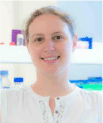A One Health approach for the genomic surveillance of AMR
Veronica M. Jarocki A B # , Max L. Cummins
A B # , Max L. Cummins  A C # , Celeste M. Donato
A C # , Celeste M. Donato  D E # , Benjamin P. Howden
D E # , Benjamin P. Howden  D F * and Steven P. Djordjevic
D F * and Steven P. Djordjevic  A C *
A C *
A
B
C
D
E
F

Dr Veronica Jarocki is a CRC SAAFE Foundational Postdoctoral Fellow based at the Australian Institute of Microbiology and Infection (AIMI) at the University of Technology—Sydney. Her research interests include genomic AMR surveillance in wastewater, humans and animals and characterising the mechanisms behind AMR dissemination between sources. She has a background in subunit vaccine design and development against animal pathogens. |

Dr Max Cummins is a researcher at AIMI at the University of Technology—Sydney, whose research interests include microbial genomics, antimicrobial resistance, bioinformatics, big data, AI and data visualisation. Max co-leads the Australian Pathogen Genomics Program’s One Health theme, utilising bioinformatic tools to generate meaningful and informative insights into bacterial populations found across humans, animals, food and the environment. |

Dr Celeste Donato is a postdoctoral researcher at the Doherty Institute and her research interests include pathogen genomics, molecular and genomic epidemiology with expertise in viral enteric pathogens. Celeste co-leads the One Health and Candida auris projects within the Australian Pathogen Genomics program. |

Benjamin Howden is Infectious Diseases Physician and Public Health Microbiologist. He is Professor and Director of the Microbiological Diagnostic Unit Public Health Laboratory at The University of Melbourne (Doherty Institute). His research interests include genomics for understanding and responding bacterial pathogens of public health significance and antimicrobial resistance. He is lead of the Australian Pathogen Genomics Program (AusPathoGen). |

Steven Djordjevic is a Distinguished Professor of Infectious Disease in the Australian Institute for Microbiology & Infection at the University of Technology—Sydney. His research interests are in antimicrobial resistance and pathogen evolution through a One Health lens. His laboratory conducts genomic epidemiological analyses of a broad range of Gram-negative bacterial pathogens, and the mobile elements they carry, from hospital and veterinary clinical environments, food production animals, urban and native wildlife, wastewater and natural water systems. |
Abstract
In the face of an escalating antimicrobial resistance (AMR) crisis, genomic technologies have emerged as indispensable allies, providing innovative tools for a nuanced understanding of the abundance, persistence and mobilisation of antimicrobial resistance genes within microbial populations. This article explores advancements in genomic surveillance, including the integration with advanced computational tools to enhance our ability to predict AMR trends, detect outbreaks, and inform mitigation strategies. It highlights the critical role of a One Health approach, emphasising the importance of cross-sectoral collaboration among scientists, health care professionals, industry and policymakers to leverage genomic data for AMR management. The article showcases pioneering initiatives in Australia, such as the Melbourne Genomics Alliance’s Controlling Superbugs Clinical Flagship, the Australian Centre for Genomic Epidemiological Microbiology and AusTrakka, and discusses the need to both build global genomic databases that promote equitable analytics, and secure data-sharing platforms that support comprehensive surveillance networks. Through national and international collaborative efforts, One Health genomic surveillance represents a key strategy in enhancing our understanding and control of AMR and should be integrated into public health frameworks to safeguard against ever emerging AMR threats.
Keywords: antimicrobial resistance, genomics, One Health, WGS, whole-genome sequencing.
 Dr Veronica Jarocki is a CRC SAAFE Foundational Postdoctoral Fellow based at the Australian Institute of Microbiology and Infection (AIMI) at the University of Technology—Sydney. Her research interests include genomic AMR surveillance in wastewater, humans and animals and characterising the mechanisms behind AMR dissemination between sources. She has a background in subunit vaccine design and development against animal pathogens. |
 Dr Max Cummins is a researcher at AIMI at the University of Technology—Sydney, whose research interests include microbial genomics, antimicrobial resistance, bioinformatics, big data, AI and data visualisation. Max co-leads the Australian Pathogen Genomics Program’s One Health theme, utilising bioinformatic tools to generate meaningful and informative insights into bacterial populations found across humans, animals, food and the environment. |
 Dr Celeste Donato is a postdoctoral researcher at the Doherty Institute and her research interests include pathogen genomics, molecular and genomic epidemiology with expertise in viral enteric pathogens. Celeste co-leads the One Health and Candida auris projects within the Australian Pathogen Genomics program. |
 Benjamin Howden is Infectious Diseases Physician and Public Health Microbiologist. He is Professor and Director of the Microbiological Diagnostic Unit Public Health Laboratory at The University of Melbourne (Doherty Institute). His research interests include genomics for understanding and responding bacterial pathogens of public health significance and antimicrobial resistance. He is lead of the Australian Pathogen Genomics Program (AusPathoGen). |
 Steven Djordjevic is a Distinguished Professor of Infectious Disease in the Australian Institute for Microbiology & Infection at the University of Technology—Sydney. His research interests are in antimicrobial resistance and pathogen evolution through a One Health lens. His laboratory conducts genomic epidemiological analyses of a broad range of Gram-negative bacterial pathogens, and the mobile elements they carry, from hospital and veterinary clinical environments, food production animals, urban and native wildlife, wastewater and natural water systems. |
References
1 Djordjevic SP et al. (2024) Genomic surveillance for antimicrobial resistance — a One Health perspective. Nat Rev Genet 25, 142-157.
| Crossref | Google Scholar | PubMed |
2 Sakagianni A et al. (2023) Using machine learning to predict antimicrobial resistance – a literature review. Antibiotics 12, 452.
| Crossref | Google Scholar | PubMed |
3 Anahtar MN et al. (2021) Applications of machine learning to the problem of antimicrobial resistance: an emerging model for translational research. J Clin Microbiol 59, e01260-20.
| Crossref | Google Scholar | PubMed |
4 Lane CR et al. (2021) Search and contain: impact of an integrated genomic and epidemiological surveillance and response program for control of carbapenemase-producing Enterobacterales. Clin Infect Dis 73, 3912-3920.
| Crossref | Google Scholar | PubMed |
5 Gorrie CL et al. (2021) Key parameters for genomics-based real-time detection and tracking of multidrug-resistant bacteria: a systematic analysis. Lancet Microbe 2, 575-583.
| Crossref | Google Scholar | PubMed |
6 Timme RE et al. (2019) Utilizing the public GenomeTrakr database for foodborne pathogen traceback. Methods Mol Biol 1918, 201-212 [Erratum in Methods Mol Biol. 1918, C1.].
| Crossref | Google Scholar | PubMed |
7 Allard MW et al. (2016) Practical value of food pathogen traceability through building a whole-genome sequencing network and database. J Clin Microbiol 54, 1975-1983.
| Crossref | Google Scholar | PubMed |
8 Hoang T et al. (2022) AusTrakka: fast-tracking nationalized genomics surveillance in response to the COVID-19 pandemic. Nat Commun 13, 865.
| Crossref | Google Scholar | PubMed |
9 Public Health Agency of Canada (2024) The Canadian Integrated Program for Antimicrobial Resistance Surveillance (CIPARS): 2022 executive summary: key and integrated findings. Cat.: HP40-351/2022E-PDF. Public Health Agency of Canada, Ottawa, ON, Canada. https://www.canada.ca/content/dam/phac-aspc/documents/services/publications/drugs-health-products-canadian-integrated-program-antimicrobial-resistance-surveillance-2022-executive-summary/canadian-integrated-program-antimicrobial-resistance-surveillance-2022-executive-summary-en.pdf
10 The University of Melbourne (2023) Centre for Pathogen Genomics: building and supporting collaborative opportunities for research, genomics-enhanced infectious disease surveillance, and capacity building and training. https://biomedicalsciences.unimelb.edu.au/departments/microbiology-Immunology/research/our-research-centres-and-programs/centre-for-pathogen-genomics (accessed 14 March 2024)
11 Stroe O (2022) Building bioinformatics capacity in Latin America. EMBLetc 2022(99), 16 November 2022. https://www.embl.org/news/embletc/issue-99/building-bioinformatics-capacity-in-latin-america/.
| Google Scholar |
12 Crow D (2019) A new wave of genomics for all. Cell 177(1), 5-7.
| Crossref | Google Scholar | PubMed |


